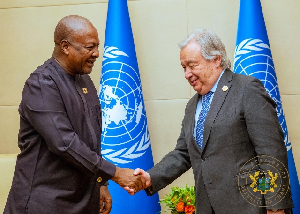I recently came across a copy of the Ghana Government Ameeri Energy contract and decided to put it under scrutiny because of what appears to be the very bad terms our Governments have been signing with companies like Ameri Energy and other mostly foreign Companies in the name of attracting foreign investment.
In this specific contract in question it appears that the terms of the contract were designed in such a way that suggests one party, Ameri Energy, has most of the bargaining power in the transaction. It looks like the contract was prepared by one party before discussions even occurred. Ghana Government just signed because they were desperate.
The evidence in the contract further suggests that Ghana was not given the opportunity to even negotiate. Under the contract, Ameeri has been excluded from liability for defects of their own equipment, unless it has been expressly specified. They are not liable for cause of damage, loss, the occurrence of death, injury or fraud. Is it not strange to learn that under the contract, Ameri Energy's risks of loss and potential damage caused by war, terrorism, civil disturbance, personal injury or force majeure has been offloaded to be solely borne by Ghana Government? This is illegal in such contract terms.
The material obligations in the contract appears to have been offloaded to burden one party, and that is Ghana and its government. The contract was probably put in front of the Ministers and officials and they were asked to sign and they did?
What is even more troubling is the fact that Ameri Energy, the UAE company supplying turbines to Ghana under the terms of a contract worth over $500million dollars was completely exempted from paying any taxes to Ghana Government on their whole operations and whatever profits they made in Ghana.
Its concerning that Under the contract, Ameri Energy was treated as a foreign company, not having a permanent establishment in the Republic of Ghana, and it appears they deliberately built a clause into the contract exempting themselves from several liabilities and obligations, as well as exempting themselves from all taxes including local ones even relating to employment of local staff and their social security contributions.
How can it be that under the contract if Ameri Energy, is obligated to pay a tax or becomes liable for tax because of future legislative changes, Ghana Government must undertake a tax adjustment and pay the taxes for Ameeri by reimbursing them in US Dollars calculated at the exchange rate in effect at the time?
In the contract its even specifies that when there is a dispute Ghanaian Law does not apply, the dispute arbitration must be in London, under English Law. Wow!
But under English law a party in a contract cannot exclude liability for death, personal injury or fraud. So there is a contradiction.
Yes our Governments have to attract foreign investments, but it's really very foolish for our governments still not to understand the negative impacts of tax avoidance by all these foreign companies operating in our countries they given massive tax holidays to. Why do we have to give massive tax holidays, and subsidize the operations of these foreign companies on our land when we do not extend the same generosity to our domestic industries set up by Ghanaian entrepreneurs?
Ameri Energy is not an exception. Most of the international investment agreements our Governments are signing with foreign companies, in the oil , Gas and mining sectors and even in the agricultural processing, mainly cocoa processing sectors of our economy, especially in the Free Zone enclaves have the same very unfair contract terms detrimental to Ghana. Ghana Government does not only give massive tax holidays, exempting these companies from paying corporate income tax in some cases for 10 years and more, but some like in the mining sectors have stability agreements built into these contracts, which insulates their companies from future changes to the tax regime that our own domestic firms owned and operated by Ghanaians cannot escape from.
In the oil and mining sectors for instance the seriously wealthy companies operating in Ghanaian are allowed by Ghanaian tax laws to write off the costs of capital expenditure against their taxable profits which can be done over a period years without paying taxes to the Ghana Government. Most of the also enjoy import exemptions and do not pay taxes of goods and services imported into the country. This is a luxury Ghanaian businessmen and entrepreneurs don't have.
How fair is this? As a result the revenue forgone as a share of GDP is staggering? This massive loss of tax revenues in the Ameeri Contract and other similar ones is costing Ghana too much revenue and puts domestic businesses at a huge disadvantage.
The world has changed. We live in a globalised world where knowledge is at our fingertips. There is no excuse anymore for the kind of questionable mind sets that continues to lock Ghana into such unfair contract terms and undermining our socio economic development continuously.
Apart from that the massive liabilities and encumbrances the Government of Ghana is enduring, as a result of having to resort to expensive and extortionate borrowing, of Eurobonds, Cocoa Syndicated Loans, local treasury bills and local borrowing, to finance its recurrent expenditure, all these difficulties could be curtailed if only our Parliament makes needed effort efforts to scrutinise and ask relevant questions relating to these contracts before agreeing or voting to uphold them for the sake of the nation's sustainable economic development.
S Nyako
1
Opinions of Monday, 1 February 2016
Columnist: Nyarko, S














